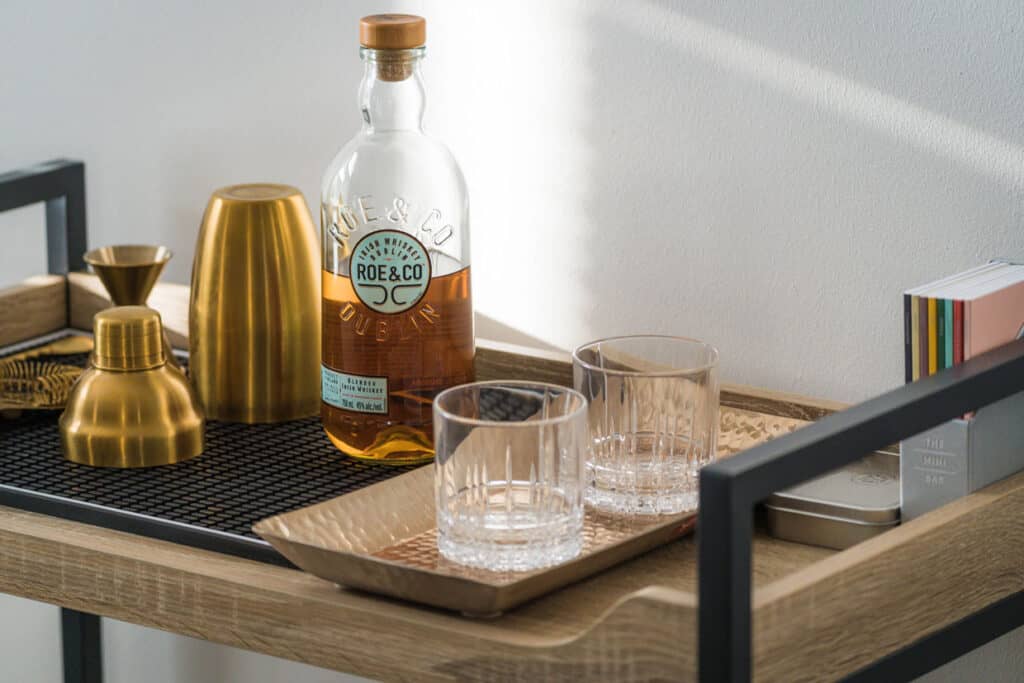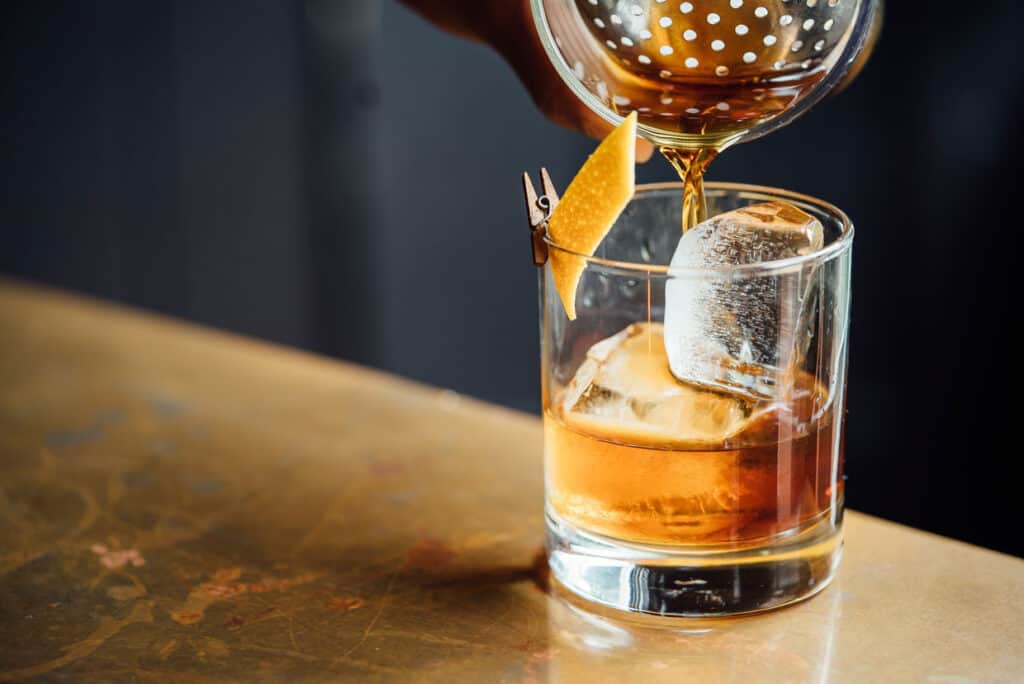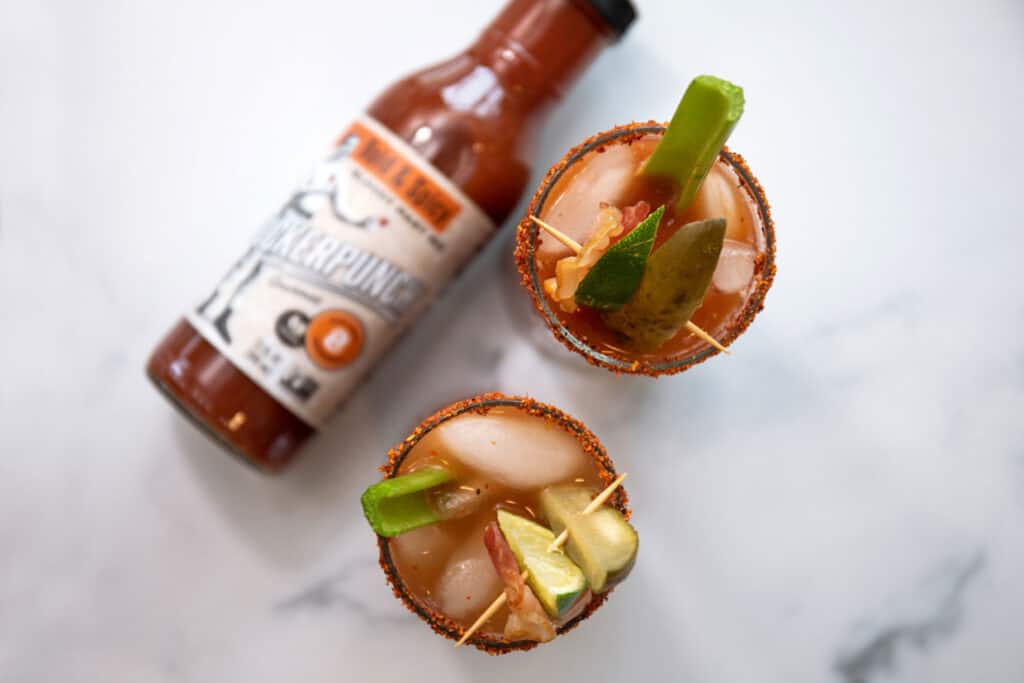Does alcohol expire? If you’ve ever wondered about this question while staring down an old bottle of liquor or wine, you’re in the right place. Here’s how to store alcohol properly.

Not everyone has a full bar setup or wine cellar in their home with the perfect temperature settings.
So if you just purchased a bottle of vodka (or whiskey or wine or whatever), you may wonder where to stash it to keep it fresh the longest and if it will ever expire.
It’s time to raise the bar and educate yourself on how to store alcohol properly. Here’s everything you need to know about whether alcohol expires and how long you can enjoy it.
Does alcohol expire?
The answer to, “does alcohol expire?” is a complicated one. The short answer is yes, it does expire. But sometimes, the answer is no — some alcohols really are drinkable indefinitely.
But the long answer is that it depends on the type of alcohol.
Some types of alcohol should be stored in the fridge, while others do just fine at room temperature.
You may remember storing vodka in the freezer in college and maybe you’ve wondered if that bottle of Irish cream should be stored in the fridge as you would milk.

Where to store alcohol
First of all, it’s a good idea to have a location in your home where you keep most of your alcohol. Some choose to set up a decorative yet functional bar cart, while others opt for a shelf or cabinet.
“We live in California where basements are fairly uncommon, so we keep our spirit collection small and tailored to our tastes. It lives on a little bar cart at the edge of the dining room that’s easily accessible but out of the way of any major foot traffic.”
— Gen La Rocca, Two Cloves Kitchen
Though it doesn’t matter how beautiful your storage situation is, it does matter how much sunlight it receives.
While exposure to the sun won’t spoil your alcohol, the warm light does affect the temperature. As a result, this speeds up the oxidation process, changing the spirit’s taste over time.
However, some types of alcohol are better off in the fridge or freezer than at room temperature.
Beer
Beer drinkers should store their cans and bottles properly for the fizziest, foamiest pours.
The first rule of thumb is that you should always store beer upright. This minimizes the amount of the beer’s surface area that’s exposed to the air trapped inside the bottle. The more air contact, the faster the beer will oxidize, breaking it down and reducing freshness.
Most canned and bottled beers last for about three months after the bottling date. Refrigeration helps to slow the oxidation process. Check the ABV on the bottle — if it’s higher than 8 percent, it can be stored at room temperature, but preferably a cool place like a basement.
The style of beer matters somewhat, too. Thrillist details the rules for storing different types of beer, from sours to IPAs.
Wine
When storing wine, it’s important to keep a consistent temperature, as extreme temperature changes can cause both the liquid and cork to expand and contract, causing seepage.
Bottles of wine should be stored between 45°F and 65°F. Anything above 70°F can affect the flavor, while too-cold temperatures can dry out the cork, letting oxygen into the bottle and causing oxidation.
Whether you go for a wine fridge or not likely depends on how often you drink wine. If you only like to have a few bottles on hand, you can store them at room temperature, ideally in the coldest part of your house, like a basement or cellar.
“My husband moved everything from our basement and that is where our wine is stored. It is not a basement anymore but a man-made wine cellar with 5 padlocks… just in case,” said Zuzana Paar of Lowcarb-Nocarb.
In general, sparkling, rosé and white wines should be chilled before serving, and red wines should not. And once you uncork a bottle, enjoy it within a week or so for the best flavor. Unless it’s champagne, whose bubbles will fizzle out after about a day.
Vermouth and other fortified wines
Once opened, vermouth and other fortified wines like sherry should be kept in the fridge and enjoyed within a few months.
Whether you’re making a negroni with sweet red vermouth or a martini, perhaps the most iconic cocktail, should especially keep their dry vermouth in the fridge.
This is due to oxidation, as oxygen enters the bottle as soon as the lid comes off.
Vermouth will keep at room temperature for a month, however, so you can do that if you plan to make a lot of vermouth cocktails in a short period of time.

Distilled spirits
When unopened, common distilled spirits — brandy, vodka, whiskey, rum, tequila and gin — have an indefinite shelf life.
Once opened, they will lose some of their flavor and aroma over time, but they won’t truly spoil.
This goes for the base spirits, AKA hard liquors, not their flavored counterparts, such as spiced rum or
Distilled spirits can and should be stored at room temperature. Keeping vodka in the freezer isn’t necessary — unless you like your vodka drinks ice cold. It will never freeze, thanks to the alcohol content, but freezing does affect the viscosity, especially for lower-quality vodkas.
Liqueurs and cordials
Liqueurs and cordials like amaretto, triple sec and limoncello are a bit different because they tend to contain less alcohol, a preservative, and more sugar and other ingredients.
Like distilled spirits, liqueurs can be kept at room temperature. However, they do not last as long, as the alcohol deteriorates the sugars.
In general, discard open bottles of liqueurs after 18 months.
Cream liqueurs
While it’s easy to think that any liquor with cream or egg in it should be refrigerated, such as Amarula or Rumchata, the storage directives for cream liqueurs vary by brand.
For example, regular Baileys Irish cream lasts two years from the bottling date, opened or unopened when stored at room temperature, while flavored versions of Baileys require refrigeration.
On the other hand, Tequila Rose, the strawberry cream liqueur, has a two-year shelf life when unopened. It should be refrigerated after opening and enjoyed within six months.
When in doubt, check the manufacturer’s website.
Zero-proof spirits
Alcohol is a preservative, so without it, non-alcoholic spirits don’t last as long.
Since they often contain extracts and flavorings that have shorter shelf lives, zero-proof spirits tend to last anywhere from three to six months.
Check the manufacturer’s website for their storage tips and expiration dates.

Mixers
While not alcoholic in nature, bottles of cocktail mixers like Bloody Mary mix and sour mix often mingle with bottles of spirits, so they deserve a quick mention here.
Store-bought mixes often have preservatives in them to keep them shelf-stable. However, the label will suggest how long you have to enjoy them after you open the bottle.
Always follow the packaging’s expiration date for items containing fresh ingredients like fruit juices.
Store-bought and homemade simple syrups will last about a month in the fridge, but if they look cloudy, it’s time to toss them out.
When to throw away alcohol
Use your common sense when it comes to deciding whether to keep a bottle or toss it.
Alcohol should be enjoyed within two years, so if you know a bottle is older than that, it’s time to toss it.
“Last summer, I went to make my peach sangria for a party, but I knew my peach liqueur was old. I took a small swig, and it was awful — totally sour. I would have ruined the entire batch if I had just assumed it was still good to use,” said Amanda McGrory-Dixon of the website Burrata and Bubbles.
If you ever spy anything suspicious — mold, cloudiness or floating objects — or detect a foul odor, it’s time to pour it down the drain.
Depending on where you live, you can likely recycle plastic and glass bottles and sometimes the lids, too.
Tips for alcohol storage
If you are deciding whether to finish off a bottle or store a little bit for later use, it’s better to finish it off. That’s because more air in the bottle means the leftover alcohol is more likely to oxidize, which can transform the taste.
It’s also a good idea to keep tabs on what alcohol you have on hand. Keeping a paper inventory sheet works well.
But you should also keep track of when it was purchased and first opened. It’s a good idea to write it on the bottom of the bottle or on a piece of tape stuck to the bottom.
“I like to tape a small piece of paper to the bottom of the bottle with the date I opened it for a reference, but nothing does the trick like a taste test first,” said McGrory-Dixon.
This might go without saying, but never let alcohol sit in a hot car. Get it inside and stored in the proper temperature as soon as you can.
Finally, if anyone in your home is under the legal drinking age, it’s wise to keep things locked up with the key in a good hiding place (but not so good that you won’t remember, of course).
Fridge or no fridge?
To sum things up, beer, wine and wine-based spirits like vermouth should be stored in the fridge.
Everything else can be stored at room temperature — but in a cool, dark place. And if it contains cream, refrigerate.
When in doubt, check with the manufacturer.
Based in Charlotte, N.C., Susannah Brinkley Henry is the cocktail content creator behind the blog Feast + West. Her work has been featured in Southern Living, Oprah Daily, Buzzfeed and more. In 2019, her website was a finalist in the Saveur Blog Awards for Best Entertaining Blog. As a professional graphic designer, photographer, writer, and recipe developer, Susannah helps home bartenders and drink enthusiasts level up their cocktail skills.